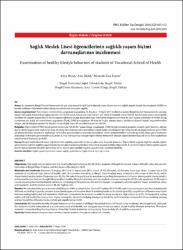Sağlık Meslek Lisesi öğrencilerinin sağlıklı yaşam biçimi davranışlarının incelenmesi
Citation
Bulut A, Bulut Aziz, Ercim RE. [Examination of healthy lifestyle behaviors of students of Vocational School of Health]. FNG & Bilim Tıp Dergisi 2016;2(2):105-112. doi: 10.5606/fng.btd.2016.020Abstract
Amaç: Bu araştırma Bingöl Devlet Hastanesi’nde yaz stajı yapan Bingöl Sağlık Meslek Lisesi öğrencilerinin sağlıklı yaşam biçimi davranışlarını (SYBD) ve bunları etkileyen faktörlerin neler olduğunu belirlemek amacıyla yapıldı.
Gereç ve yöntemler: Tanımlayıcı nitelikteki bu çalışmanın kapsamına, 10 Ağustos - 11 Eylül 2015 tarihleri arasında Bingöl Devlet Hastanesi’nde yaz stajı yapan 120 sağlık meslek lisesi öğrencisinden 112’si (50 erkek, 62 kız; ort. yaş 16.6±1.1 yıl) alındı (Cevaplılık oranı: %93.3). Katılımcılara sosyo-demografik özellikler ile sağlıklı yaşam biçimi davranışlarını etkileyebileceği düşünülen bazı faktörlerin değerlendirilmesi ile ilgili sorular yöneltildi ve SYBD ölçeği sorularının yer aldığı bir anket formu uygulandı. Ölçek, SYBD’yi sorgulayan 48 soru ve ‘hiçbir zaman, bazen, sıklıkla ve düzenli olarak’ seçeneklerinden oluşan, altı alt bileşene ayrılan bir ölçektir ve en düşük puan 48, en yüksek puan ise 192’dir.
Bulgular: Öğrencilerin SYBD ölçeği genel ortalaması 126.9±28.7 puan olarak hesaplandı. SYBD ölçeği ortalama puanları cinsiyet, gelir durumu, ailenin tipi ve ailede sigara içme alışkanlığı olup olmadığı durumlarına göre istatistiksel olarak farklı bulunmazken (p>0.05); lisede okuduğu bölüme göre SYBD alt bileşenlerinden beslenme alışkanlığı ve kendini gerçekleştirme arasında istatistiksel olarak anlamlı farklılık bulundu (p<0.05). Buna göre beslenme alışkanlığı ve kendini gerçekleştirme puanları acil tıp teknisyenliği okuyan öğrencilerde hemşirelik okuyan öğrencilerden fazla idi ve bu fark istatistiksel olarak anlamlı bulundu (p<0.05).
Sonuç: Bingöl Sağlık Meslek Lisesi öğrencilerinin sağlıklı yaşam biçimi davranışları orta düzeyde bulundu. Öğrencilerin sağlıkla ilgili bir okulda eğitim görmelerine rağmen sağlıklı yaşam biçimi davranışları hakkında yeterince farkındalık kazanmadıkları düşünüldü. Bu nedenle öğrencilerin sağlıklı yaşam biçimi davranışlarının önemini kavraması ve bu davranışları günlük hayatta uygulamaları desteklenmelidir. Objectives: This study aims to determine the healthy lifestyle behaviors (HLSB) of the students of Bingöl Vocational School of Health, who did summer internship at Bingöl State Hospital, and the factors affecting the HLBS.
Materials and methods: Between 10 August 2015 and 11 September 2015, a total of 112 (50 males, 62 females; mean age 16.6±1.1 years) out of 120 students of vocational high school of health, who did summer internship at Bingöl State Hospital were included in the scope of this study, which characterized as descriptive (Response rate: 93.3%). We asked the participants questions regarding the assessment of socio-demographic characteristics and several factors that are thought likely to affect healthy lifestyle behaviors, and we applied a survey covering the HLSB scale questions. HLSB scale is a scale inquiring the healthy lifestyle behaviors, consisting of 48 questions, divided into six sub-components with the options “never, sometimes, often and regularly”, and the lowest score is 48, the highest 192.
Results: We calculated the general mean of HLSB scale of the students to be 126.9±28.7 points. While HLSB scale mean scores were not found statistically different according to gender, income status, family type and whether there is smoking habits in the family (p>0.05), a significant difference was found between eating habits and self-realization HLSB sub-components in accordance with the areas studied at high school (p<0.05). Consequently, eating habits and self-realization scores were higher among the students studying emergency medicine technicianship compared to those studying nursing and we found this difference to be statistically significant (p<0.05).
Conclusion: We found the healthy lifestyle behaviors of the students of Bingöl Vocational School of Health to be moderate. We thought that, although the students receive education at a school associated with health, not adequate awareness was raised about healthy lifestyle behaviors. Therefore, students’ comprehending the importance of healthy lifestyle behaviors and applying these in daily life should be supported.


















